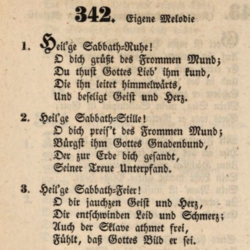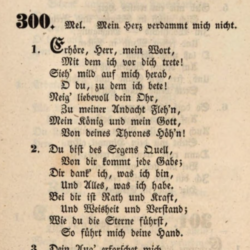This is the Hamburg Temple Hymnal in its original 1833 edition, alternately titled, Allgemeines Israelitisches Gesangbüch fur Gotteshaüser und Schulen, compiled by Maimon Fraenkel, Gotthold Salomon, and Immanuel Wohlwill.

TOGGLE COLUMNS (on/off):ADJUST COLUMN POSITIONS: select the column header cell and drag it where you want. show me!COPY INDIVIDUAL COLUMN(S): use CopyTables, a browser extension.
Source (German) Translation (English)
D. M. Fraenkel,
D. G. Salomon,
D. I. Wohlwill,
Mitglieder der Commission zur Redaction und Herausgabe des neuen Gesangbuches.
D. M. Fraenkel,
D. G. Salomon,
D. I. Wohlwill,
Members of the Commission for the Editing and Publication of the New Hymnal.
Notes
| 1 | Zwei der Herren Mitarbeiter haben jedoch seitdem einige von ihren Beiträgen in besondern Sammlungen abdrucken lassen. Bermuthlich hat die duch Umstände etwas verzögerte Erscheinung des Buches sie dazu veranlaßt. |
|---|---|
| 2 | Two of the contributors, however, have since had some of their contributions printed in special collections. The publication of the book was somewhat delayed by circumstances, which prompted them to do so. |

“📖 Allgemeines Israelitisches Gesangbuch eingeführt in dem Neuen Israelitschen Tempel zu Hamburg (1833)” is shared through the Open Siddur Project with a Creative Commons Attribution-ShareAlike 4.0 International copyleft license.










Comments, Corrections, and Queries